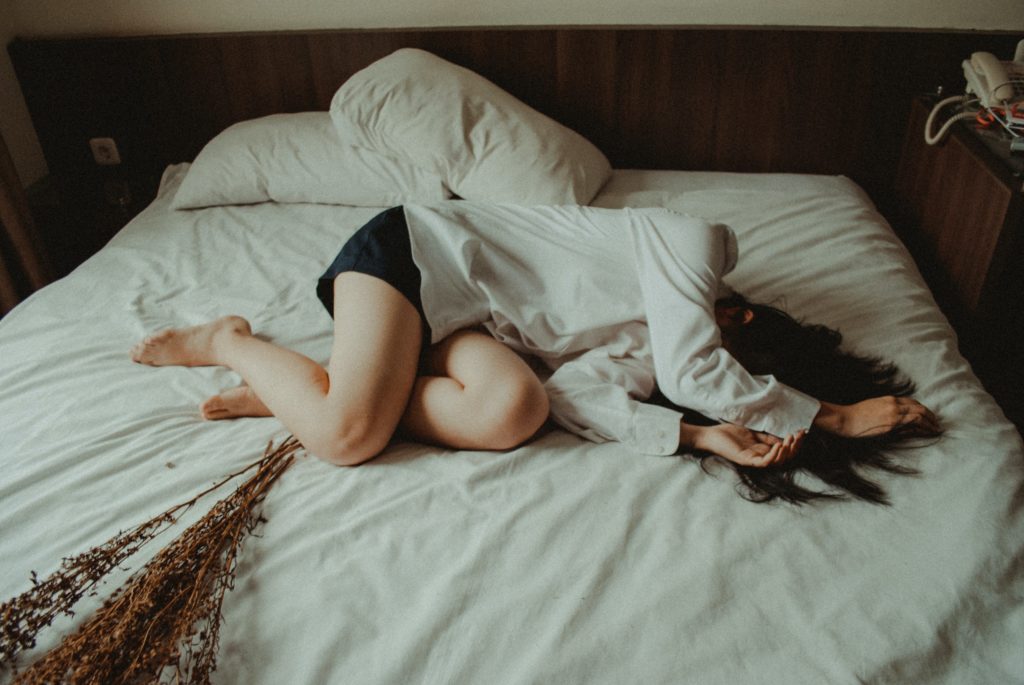Having good sleep is super important for your physical and mental health. In terms of physical wellbeing, sleep helps to heal and repair your heart and blood vessels. And if that is not enough for you to prioritise your sleep, we want you to know that when you don’t sleep well, you’re at higher risk of heart disease, diabetes, stroke, and more. But Glitz understands that good sleep doesn’t come often for most of us. We also know that a lot of you experience sleep paralysis, which is a scary and uncomfortable experience. If this is something that occurs on a daily basis for you, it might mean something more serious. In this article, we’re teaching you everything you need to know about this occurrence and how to treat sleep paralysis.
What Is Sleep Paralysis?
Contents
Sleep paralysis is when you experience a loss of muscle function. This happens very briefly. Scientifically, this occurrence is known as atonia. Atonia happens when you’re about to fall asleep, immediately after falling asleep or about to wake up. Basically, it happens when you’re mind is not fully asleep. But atonia is commonly accompanied by hallucinations and sometimes fear. Many may associate this experience with a spiritual attack but it is actually a pretty common occurrence. So you should not need to worry. Oftentimes, medical intervention is not needed. But if you happen to experience it every single day, you might want to seek a medical professional on how to treat sleep paralysis.
How Does A Sleep Paralysis Feel Like?

Before we tell you how it feels like to go through sleep paralysis, it is important that we let you know that you shouldn’t panic. Knowing the symptoms can help you remain calm when you’re going through sleep paralysis. The good thing about knowing when you’re experiencing sleep paralysis is that you can also control your thoughts. So here’s how sleep paralysis feels like.
Sleep paralysis may feel like you’re in a dream while being completely awake. During this time you will feel that you are unable to speak or move. But this is usually not the reason why people panic when going through sleep paralysis. In fact, fear builds up because they experience hallucinations. You may sometimes see a black figure at the edge of your bed or sometimes even on top of you. During sleep paralysis, you may also feel as if someone is pushing down on you or choking you. This may cause you to feel as if you are dying and that you’re struggling to breathe.
But remain calm, as sleep paralysis usually only lasts for a few seconds to 2 minutes. The occurrence tends to end on its own or when someone wakes you up or touches you. You may be sweating when you wake up from sleep paralysis. But that is completely normal due to the fear you are having. Now that you know what sleep paralysis feels like, there is no need to worry if you ever go through the same thing again.
Why Does It Occur?

There isn’t an exact reason why sleep paralysis occurs in us. But a few reasons have been identified and may just answer your burning question. Firstly, people who have trouble sleeping properly may be at higher risk of experiencing sleep paralysis. This also includes people with sleeping disorders, particularly those obstructive sleep ones. Other than that, people who have insomnia or like to sleep a lot during the day might also experience sleep paralysis often. Those who are adjusting to new time zones, people who are having jet lag, and those who work shifts also have a higher risk of experiencing sleep paralysis.
However, that is not all. People who are diagnosed with mental health disorders may also be at higher risk. We’re specifically talking about people with anxiety disorders or post-traumatic stress disorder (PTSD). This is because these disorders usually affect a person’s sleep schedule and thus, not allow them to rest completely. As we’re on the topic of mental health disorders, stopping your antidepressants can also leave you at a higher risk of experiencing sleep paralysis. This will also happen when to people with a family history of sleep paralysis.
Do you tend to daydream often when going through your daily routine? Well, that may just be the reason why you’re experiencing sleep paralysis so often. It is apparent that people who are imaginative or have traits of disassociating from reality experience sleep paralysis more often. Aside from that, there is also a link between sleep paralysis and nightmares as well as lucid dreaming. But it is important to note that all of these reasons have not been concluded. There are many reasons why sleep paralysis occurs and these are just some of them.
How To Treat Sleep Paralysis?

Did you just experience a sleep paralysis occurrence and are now curious about how to treat sleep paralysis? Well, we’ve got you covered. The very first step on how to treat sleep paralysis is identifying the reason behind your episodes. More often than not, it occurs because you did not have a healthy sleep. Thus, the next step on how to treat sleep paralysis is to get your sleep schedule back on track.
Firstly, set a time to sleep and wake up every day and stick strictly to it. This includes on weekends as well. You also have to make sure that you get at least seven hours of sleep every night. It is vital to follow this sternly in order to achieve healthy sleep, which will then decrease your sleep paralysis occurrences. Another thing you should do is to ensure your pre-sleep routine is relaxing to your mind and body. For example, you can drop a few essential oils in your humidifier to calm your room down. If your room is too hot, then cool it down with an air conditioner. Just ensure that your bedroom is comfortable before you go to bed.
Next, your bedroom environment is also a step on how to treat sleep paralysis. Make sure your bedroom is away from any light or noise distractions that may disturb your sleep. Try getting blackout curtains if you are someone that can wake up easily to the slightest peek of sunlight. As for noise, try getting a unit that is not so near to the highway or public transport. This however is sometimes unavoidable so maybe wearing earbuds when you sleep is a good idea instead.
Another great way on how to treat sleep paralysis is to reduce alcohol and caffeine intake, especially during the night. This is because they keep you awake and may trigger a sleep paralysis occurrence. Lastly, it is also a good idea to keep your phones away at least 30 minutes before you sleep. This is because the blue light from the phone actually keeps you awake. Instead, grab a book to read before heading off to bed.
What Can I Do To Ensure It Doesn’t Happen Again?

If you are experiencing sleep paralysis every single day, it is recommended that you go to the doctor. This is because there may be another underlying condition that causes this occurrence to happen all the time. But if it just happens once in a blue moon, keeping to a strict sleep schedule should help you keep the sleep paralysis at bay. You should also be conscious about it and not push it under the rug. As soon as you experience sleep paralysis, then you should immediately start making changes to your lifestyle. This can prevent it from getting worse.
Did you like this article? Then make sure to follow us on Facebook and Instagram for more lifestyle-related information.


















